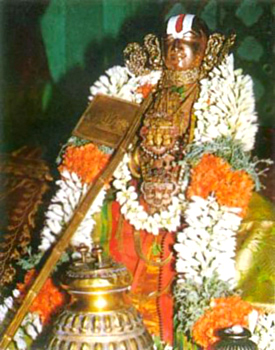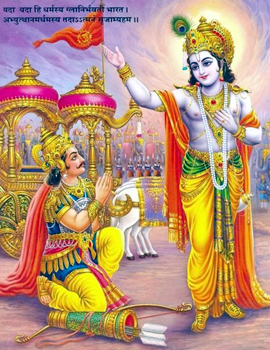 Jiva is said to be the knower or the subject of knowledge. This jiva, which is the knower, is also the agent of action (karta) and the enjoyer of pleasure and pain (bhokta). This truth is evidenced not only by our perceptual experience but also by the scriptural text. The same Upanishadic text which speaks of jiva as boddha or knower, asserts that it is also karta. It stands to reason that the same jivatman which performs a particular deed (karma) should also enjoy the fruit of the deed. This apart, the scriptural texts which enjoin the performance of Vedic rites by an individual would become meaningless if the jivatman were not admitted as both the agent of action and the enjoyer of the result.
Jiva is said to be the knower or the subject of knowledge. This jiva, which is the knower, is also the agent of action (karta) and the enjoyer of pleasure and pain (bhokta). This truth is evidenced not only by our perceptual experience but also by the scriptural text. The same Upanishadic text which speaks of jiva as boddha or knower, asserts that it is also karta. It stands to reason that the same jivatman which performs a particular deed (karma) should also enjoy the fruit of the deed. This apart, the scriptural texts which enjoin the performance of Vedic rites by an individual would become meaningless if the jivatman were not admitted as both the agent of action and the enjoyer of the result.
According to the author of the Vedanta Sutra, "Jiva is an agent on account of Scripture (thus) having a purport." Commenting on this Sutra, Ramanuja explains that when sacred texts (shastra) enjoin the performance of a Vedic ritual for the achievement of heaven, they are addressed only to the intelligent agents of action who can enjoy the fruit. Shastra means to command (sasandaca shastram). A command is intended to induce one to do a particular act and it is meaningful only in respect of an intelligent agent and not for one who is non-sentient (acetana). In view of this an individual who is intelligent to understand a command, is actually the agent of action and he alone is the enjoyer of the fruit of action.
The jiva is regarded as jnata in the sense that it is the asraya or substrate for the functional knowledge through which all experiences take place. By merely being an asraya for jnana which is actually subject to modification, jiva remains unchanged. In the same way, jiva is karta or doer in the sense that it is the asraya or substrate for kriti (effort). Effort is caused by a desire to do an act. The desire is a mental modification, an avastha of jnana. It is not to be confused with the actual physical activity which follows subsequent to the desire to do an act. In so far as jiva is an asraya for kirti or prayatna prompted by desire which is actually a particular state of the knowledge, jiva becomes the karta. The change involved in the physical activity pertains directly to the body and sense organs and it does not affect the soul which is only a substrate for knowledge.
The same explanation holds good for jiva being the bhokta or one who is the enjoyer of pleasure and pain. Bhoga is an experience in the form of pleasure or pain. Pleasure and pain are different states of jnana. Pleasure, according to Visistadvaita, is an agreeable disposition of the knowledge (anukula jnana) and pain is its disagreeable disposition (pratikula jnana). As jiva is asraya for such states of experience, it is regarded as bhokta or enjoyer of pleasure and pain. The changes involved in such mental disposition apply to the attributive knowledge and not to jiva. It is logically possible to maintain this position since according to Visistadvaita, a substance is distinct from its attribute and what pertains to the latter does not directly apply to the former.
 It may be mentioned here that though the jivatman is a karta, its actions are ultimately caused by Paramatman as has been stated by the Vedanta Sutra which is based on the Sruti and Smriti texts. The Brhadaranyaka Upanishad points out that Paramatman as the indweller of all beings controls them. Another scriptural text explicitly says, "Isvara controls all individuals by residing within their bodies." The Bhagavad Gita also reiterates that Isvara resides in the hearts of all beings and thereby controls their activities by his divine power. On the authority of these scriptural statements the Visistadvaita Vedanta maintains the view that the activities of jivatman are controlled by Paramatman.
It may be mentioned here that though the jivatman is a karta, its actions are ultimately caused by Paramatman as has been stated by the Vedanta Sutra which is based on the Sruti and Smriti texts. The Brhadaranyaka Upanishad points out that Paramatman as the indweller of all beings controls them. Another scriptural text explicitly says, "Isvara controls all individuals by residing within their bodies." The Bhagavad Gita also reiterates that Isvara resides in the hearts of all beings and thereby controls their activities by his divine power. On the authority of these scriptural statements the Visistadvaita Vedanta maintains the view that the activities of jivatman are controlled by Paramatman.
This raises an important question related to the freedom of an individual. If the action of jiva is controlled by Paramatman, does the individual have any freedom at all to act? If he had no freedom to act, it would follow that scriptural injunction enjoining certain moral duties would have no significance. Ramanuja provides an answer to this question on the basis of the Vedanta sutra. A distinction is drawn between the initial action of an individual and the activities that follow subsequently. In all human effort, the individual initially wills to do a thing by exercising the mental faculty provided to all human beings by God as the creator of the universe. To this extent, he is free to do what he so desires. This desire arises as a result of the influence of the latent tendencies (vasana) acquired by the individual from his karma or deeds of the past. In the matter of initial action, God`s will has no part to play. Isvara remains a passive spectator (upeksaka) allowing the law of karma to take its own course. It is entirely the choice of an individual and to this extent he is free to think and initiate any activity. Based on this initial action, the activity which subsequently follows is approved by Isvara (anumanta). By according such an approval, Isvara as antaryami prompts the individual to proceed further.
Were it not so, the Vedic injunctions in this regard would lose their value. By merely giving an approval to the activity initiated by an individual, Isvara does not become a karta or the doer. The actual karta is the individual himself. The initial action, for which the individual has the responsibility, determines the moral responsibility of that individual. The mere according of an approval to an initial act does not put any blame on Isvara. If God only accords mere approval to the subsequent act and remains a passive spectator of the subsequent act without preventing a sinful action, it is because the individual who primarily acts under the influence of his past karma is allowed to reap the consequences of his karma.
There are two kinds of causal factors in the moral world: a general cause (sadharana-karana) and specific cause (visesa-karana). For instance, the rainwater, which falls on a particular piece of land, is a common cause for the growth of plants. The special effort made by an individual to cultivate the land with the help of the rainwater is the special cause for getting a better yield on that land. In the same way, God acts as a general cause because he has granted to everyone the faculty to think and the physical ability to function. The individual is the special cause since he exercises his innate mental faculty and physical power granted to him by a compassionate God. The special effort is responsible for the final result. In this regard, God has no role to play. Any failure on the part of the individual to exercise his other abilities is not and cannot be the fault of Isvara.
Thus, the freedom given by God to an individual does not in any way affect the freedom of Isvara.




















